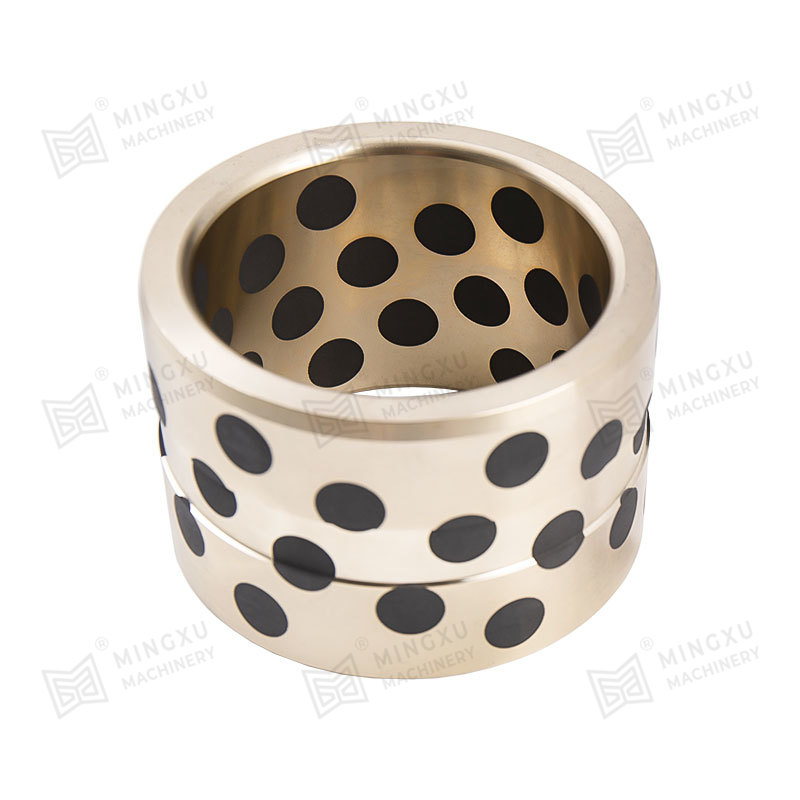MXB-JTW Metric Thrust Washer For Vehicle Transmissions
Cat:Self-Lubricating Bearing
MXB-JTW metric thrust washers are based on high-strength brass (ZCuZn25Al6), with solid lubricant (graphite or molybdenum disulfide) embedded in the m...
See DetailsAs global industries face mounting pressure to meet UN Sustainable Development Goals, solid-lubricated bearings are emerging as a silent sustainability powerhouse. Recent EPA data reveals these friction solutions can slash industrial waste streams by 38-42% — a transformative leap toward circular manufacturing.
Traditional oil/grease-lubricated bearing systems generate waste through:
Lubricant disposal: 85% of spent oils become hazardous waste (ISO 14001 audits)
Component replacement: Premature failures from lubricant contamination
Cleaning chemicals: Solvents used to remove leaked oils (avg. 200L/year per machine)
A 2023 Journal of Cleaner Production study found 23% of manufacturing facilities' carbon footprints originate from lubrication-related waste management.
Solid-film bearings eliminate:
✔️ Annual lubricant replenishment (avg. 12kg/bearing/year)
✔️ Oil-filter cartridges (6-8 units/bearing lifecycle)
✔️ Degreaser chemicals
Example: SKF's DryLube bearings reduced lubricant consumption by 28,000 tons/year across 47 automotive plants.
Self-lubricating materials like PTFE-metal hybrids demonstrate:
3-5x longer service life vs. oil-lubricated counterparts
92% less wear debris generation (ASTM D4172 tests)
![Lifecycle waste comparison: oil vs solid lubricated bearings]
Data Source: ISO 14040 Life Cycle Assessment of Bearing Systems

Solid lubricants reduce friction losses by:
15-18% in medium-load applications (NREL energy audits)
8% average drop in motor power consumption
A multinational replaced 2,400 grease-lubricated bearings with graphite-embedded stainless steel bearings:
Waste reduction: 43% decrease in annual hazardous waste (from 8.2 to 4.7 tons)
Energy savings: €126,000/year from reduced friction and cleaner motors
Downtime: 76% fewer contamination-induced stoppages
Key considerations for eco-conscious transitions:
Material compatibility: Ensure solid lubricants (e.g., WS₂, hBN) match operating temperatures (-200°C to 800°C)
End-of-life recovery: Opt for mono-material designs like sintered bronze-PTFE for easier recycling
Certifications: Look for bearings compliant with ISO 14006 (Ecodesign) and Cradle to Cradle Silver
Leading manufacturers like NTN-SNR now provide carbon footprint calculators for bearing lifecycle analysis.
With the EU's 2027 Industrial Emissions Directive mandating 50% lubrication waste reductions, solid-film bearings are becoming strategic sustainability assets. Emerging breakthroughs like bio-based solid lubricants (castor oil-derived polymers) and AI-powered wear prediction are set to push waste reduction beyond 60% by 2030.

MXB-JTW metric thrust washers are based on high-strength brass (ZCuZn25Al6), with solid lubricant (graphite or molybdenum disulfide) embedded in the m...
See Details
MXB-JOLP self-lubricating wear plates have good self-lubricating properties and require no external lubrication. This product has good load-bearing ca...
See Details
MXB-JGLX self-lubricating guide rails cover multiple properties such as high wear resistance, high temperature resistance, corrosion resistance, etc.,...
See Details
MXB-JSP self-lubricating wear-resistant plate is suitable for injection molding machines, automotive stamping molds, tire molds, factory machinery (ex...
See Details
The MXB-JSL L-type self-lubricating guide rail is installed at the mold closing guide position of the mold to provide guide lubrication and certain pr...
See Details
MJGB oil-free injection guide bushings are standard components used in the plastic injection molding process, providing lubrication-free guidance and ...
See Details
MX2000-1 graphite embedded alloy bearing, MX2000-1 graphite scattered alloy bearing is an improved product of JF800 bimetallic bearing. It has the pre...
See Details
SF-1B bronze basic bearing is made of tin bronze as the base, sintered bronze spherical powder in the middle, and rolled PTFE and high temperature res...
See Details
SF-1S stainless steel corrosion-resistant bearing is a very effective corrosion-resistant material that is formed by rolling with stainless steel as t...
See Details
Boundary lubricated lead-free bearings are improved on the basis of SF-2. Its performance is the same as SF-2, but the surface does not contain lead, ...
See Details
Contact Us